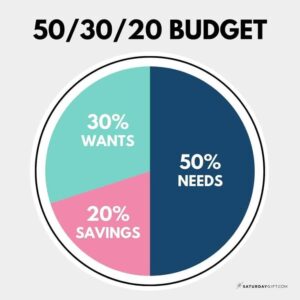10 simple money management tips for Beginners. Let’s dive into the world of personal finance, budgeting, and smart money management with practical steps you can take today.
1. Understand Why Money Management Matters
If you don’t control your money, your money will control you. Whether you’re earning in dollars, pounds, or rupees, knowing how to manage money gives you peace of mind, reduces financial stress, and helps you reach your goals—like buying a home, starting a business, or taking a vacation.Money management is not just about saving—it’s about making smart decisions daily.
2. Start with a Simple Budget
Budgeting is the foundation of how to manage your money. It tells you where your money is going and helps you stay on track.
How to Start:
List your income (job, freelancing, side hustles)
List your monthly expenses (rent, food, internet, etc.)
Categorize into needs, wants, and savings
Try the 50/30/20 Rule:
50% for needs
30% for wants
20% for savings

3.Use the Best Money Management App
Apps make it easy to track your finances on the go.
Best Money Management Apps:
USA & UK: Mint, YNAB (You Need A Budget), Goodbudget
Pakistan: Money Manager, Wallet – Daily Budget & Expense Tracker
These apps help you organize your spending, set goals, and avoid overspending.
If you prefer your laptop, try personal money management software like:
PocketGuard
EveryDollar
Spendee
4.Set Clear Financial Goals
Want to buy a car? Save for a wedding? Build an emergency fund?
Write down your short-term (0-6 months), mid-term (6-18 months), and long-term (2+ years) financial goals.
Examples:
Short-term: Save $500 in 3 months
Mid-term: Pay off credit card debt
Long-term: Buy a home in 5 years
Goals give your money a purpose.
5.Track Every Rupee, Dollar, or Pound
You can’t manage what you don’t measure.
Whether you’re in Pakistan, the UK, or the USA, tracking your spending helps you see where your money goes.
Use:
Apps (like Mint, Wallet)
Spreadsheets (Google Sheets or Excel)
Manual journals (great for beginners)
After 30 days, you’ll be surprised where your money is leaking.

6.Avoid Unnecessary Debt
Not all debt is bad (like student loans or mortgages), but avoid credit card debt or “buy now, pay later” traps.
If you’re already in debt, start a repayment plan. Look into organizations like Money Management International (MMI)—they offer professional debt counseling, especially for USA-based individuals.
Tip: Always pay more than the minimum due amount on your credit card.
7.Automate Your Finances
This is a game-changer.
What You Can Automate:
Bill payments
Savings transfers
Investments (like mutual funds or retirement accounts)
Automation means you don’t have to remember everything—and it helps you manage money better without stress.
8.Build a Better Money Mindset
Money management isn’t just about math—it’s about habits and emotions.
Avoid impulsive shopping and comparison culture (especially on social media). Instead:
Practice gratitude
Track your wins
Celebrate small savings milestones
Even saving $10/week builds a positive habit.
9.Build an Emergency Fund
This is money you don’t touch unless there’s an emergency (job loss, medical bill, urgent travel).
Start small:
Set aside 1,000 PKR / $10 / £10 a week
Keep it in a separate bank account or digital wallet
Having this fund helps you stay calm in unexpected situations.
10.Keep Learning About Money
Money management is a lifelong skill—keep learning!
Resources to Explore:
Blogs like NerdWallet, The Balance (USA), MoneySavingExpert (UK)
YouTube channels like Graham Stephan, Mark Tilbury
Local content in Urdu for Pakistani users (e.g. “Parhlo Finance”, “Income Talks”)
Follow real people sharing real tips and adapt them to your country and lifestyle.
Final Thoughts
Whether you’re a student in Lahore, a freelancer in London, or a full-time employee in New York, the principles of how to manage money are universal.Start small. Stay consistent. Use tools like the best money management app, follow the 50/30/20 rule, and most importantly—take control of your money before it controls you.


hello